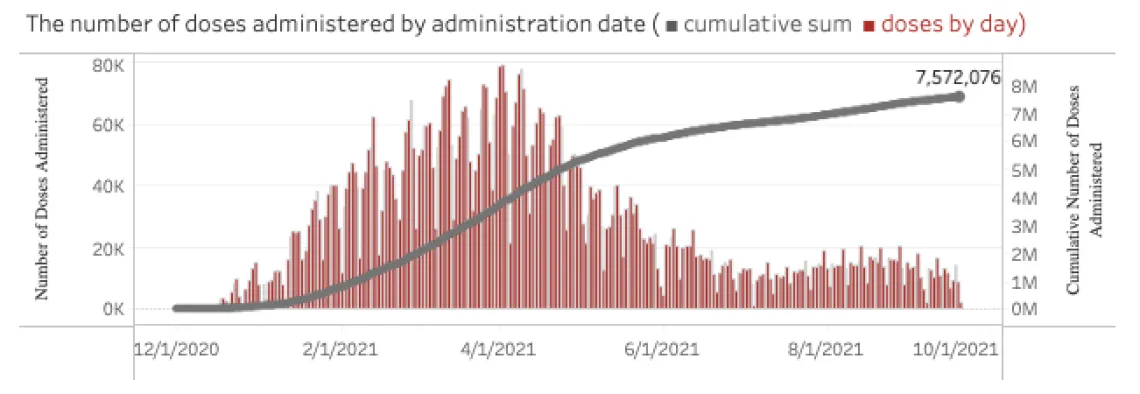What You Need to Know-Week of September 20th
The most important weekly updates for you to keep your community healthy

In this Update:
1. Urgent Updates: COVID-19 Metrics
2. All Things Vaccines: Booster Shots
3. Reminder: Evolving COVID-19 guidance is good!
1. Urgent Updates: COVID-19 Metrics
Updated as of: 09-20-2021
Weekly case, death, and hospitalization counts
| In the past week, there has been an average of: | |
| Cases per day | 2,600 |
| Deaths per day | 47 |
| Compared to two weeks ago: | |
| Cases per day | Decreased by 19% ↓ |
| Deaths per day | Increased by 32% ↑ |
| Hospitalizations per day | Decreased by 2% ↓ |
View all data related to covid19 in arizona state
Hospital Capacity Metrics:
| Percent of Arizona hospital beds currently in use | 91% |
|---|---|
| Percent of Arizona hospital beds currently in use by COVID-19 patients | 30% |
Vaccine Information:
| Number of Arizonans | Percentage of Arizonans | Percentage in United States | |
|---|---|---|---|
| Arizonans who are fully vaccinated | 3,648,617 | 50% | 55% |
| Arizonans who have received at least one dose (of a Pfizer or Moderna vaccine) |
4,124,175 |
58% |
64% |
7,572,076 total COVID-19 vaccine doses have been administered in Arizona

See breakdown of vaccination by Arizona counties
See updated vaccine information and data in Arizona
2. All Things Vaccines: When will children younger than 12 be able to receive a COVID-19 vaccine?
Increased transmissibility, higher risk of post-vaccine infections (also known as “break-through infections”) and severity of COVID-19 attributed to the Delta variant has expedited discussions surrounding COVID-19 booster vaccines. It has been shown that the effectiveness of the SARS-CoV-2 vaccines to prevent infections are reduced against the Delta variant. Luckily, protection is still significant; around 65% and if you do become infected you can’t infect people as long as if you were unvaccinated and you are far less likely to get severe disease or die. For more information about the Delta variant and vaccines, visit our previous update.
You may be wondering if and when you will be eligible for your booster shot – some of you may already be eligible.
Immunosuppressed individuals:
In the middle of August 2021, additional vaccine doses became available and recommended for certain immunocompromised individuals including organ transplant recipients and those receiving active treatment for cancer. For those who fit this description, additional doses should be available at your nearby pharmacy. It is recommended that the additional dose be given four weeks after the second dose. Visit the CDC’s website for a comprehensive list of who is advised to receive an additional COVID-19 vaccination.
Why is it important for this group of people to receive an additional dose? Because immunosuppressed individuals may not mount as significant of an immune response to the vaccines, compared to those who are not immunosuppressed. Recent data suggests that another dose of a COVID-19 vaccine may be able to prevent serious disease in individuals who had low or no protection after two doses of a Pfizer or Moderna vaccine.
The current guidance suggests that those who are recommended to receive a booster shot can do so 4 weeks after getting their second dose of a Pfizer or Moderna vaccine. Those who have received a third (Pfizer or Moderna) vaccination report mostly mild side effects that were similar to those experienced after receiving two shots. Commonly reported side effects included pain at the injection site and fatigue. However, there is not yet enough data to recommend a second shot for immunosuppressed people who received the J&J vaccine.
Non-immunosuppressed individuals:
Recommendations for booster shots among non-immunosuppressed individuals are currently being discussed among the CDC and the Biden administration. Recently, the administration announced a plan for booster shots. Those who are 8 months or more past their second vaccination dose will be eligible for a booster beginning September 20th, 2021. However, there are still groups from the CDC and FDA reviewing data to determine if this is the best way forward. Data is being collected and analyzed to ensure the safety and efficacy of a third shot for this group. Pfizer has announced that they will be seeking authorization of a booster shot, but at this time, the CDC is not recommending additional booster shots for anyone who is not immunocompromised.
Currently, the booster shot that would be available would be a third shot that is the same as the previous two shots. However, work is being done to make mRNA vaccine boosters that target some of the common variants that are impacting the US and the world. Data is not yet available on these new formulations.
3. Reminder: Evolving COVID-19 guidance is good!
It is important to remember that the science surrounding COVID-19 is evolving as the circumstances change (i.e., new variants arise), and as more is understood about the virus and its variations. An example of this can be found in the above article on booster shots! Scientists and health professionals across the world are working tirelessly to better understand all facets of the virus. Updates to existing guidance are actually a good thing. These changes show that we are learning more about the most successful methods for preventing and treating COVID-19! Staying up to date on the evolving guidance is important to protecting yourself and those around you. Keep checking AZCOVIDTXT’s weekly updates for updated information as recommendations do change.
The next update will cover information about whether vaccinated individuals can spread SARS-CoV-2. If you would like to learn more about this and other topics related to COVID-19 in Arizona, please complete next week’s AZCOVIDTXT survey that you will receive via text in about a week.
